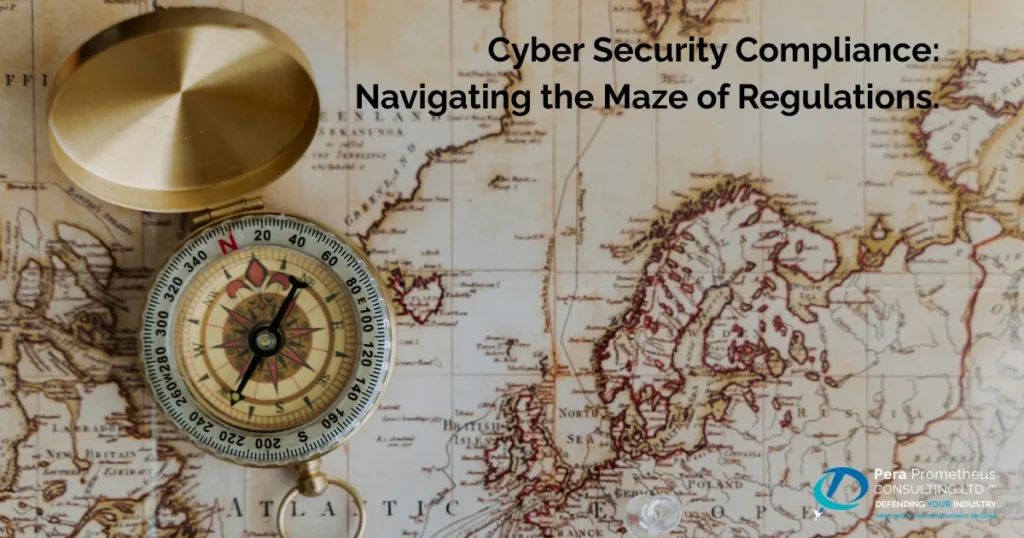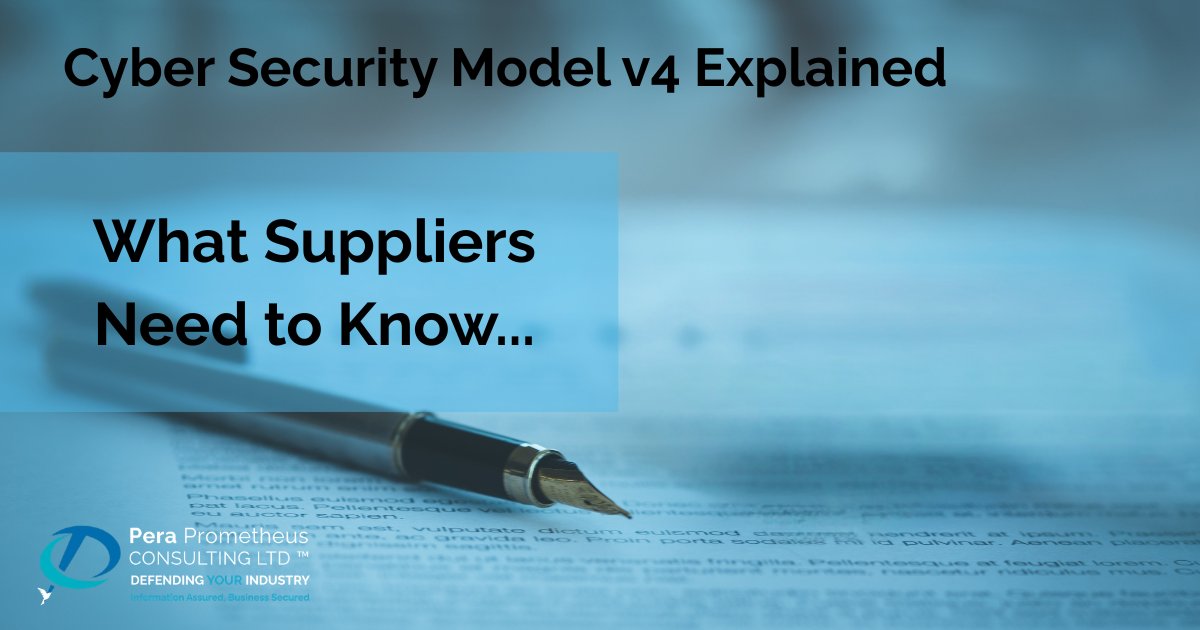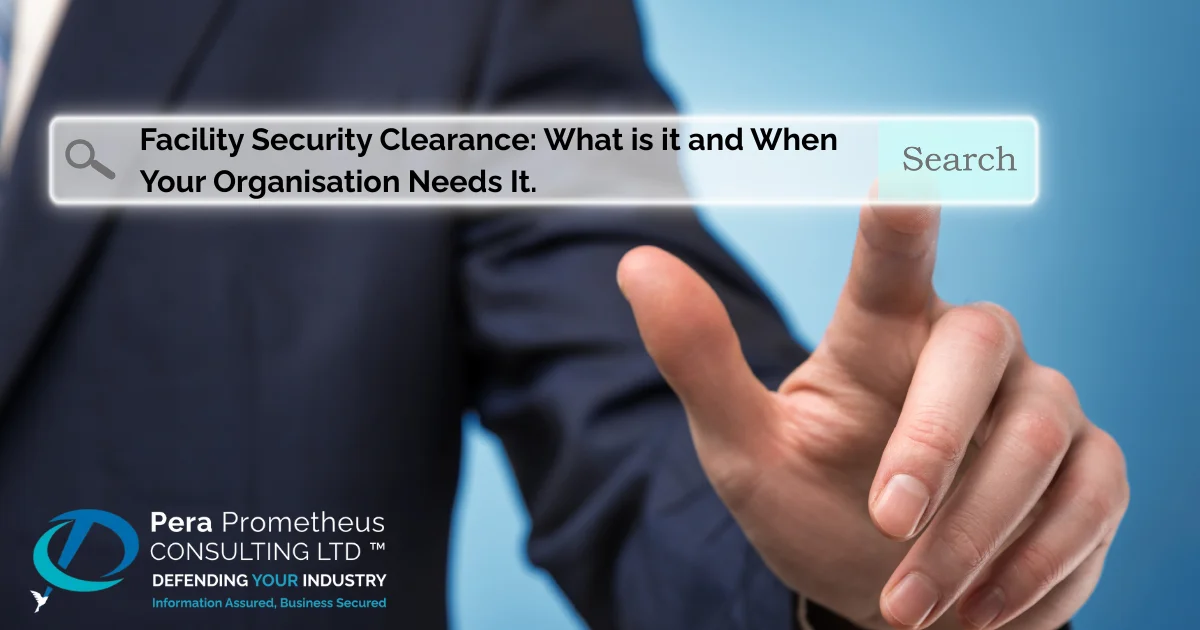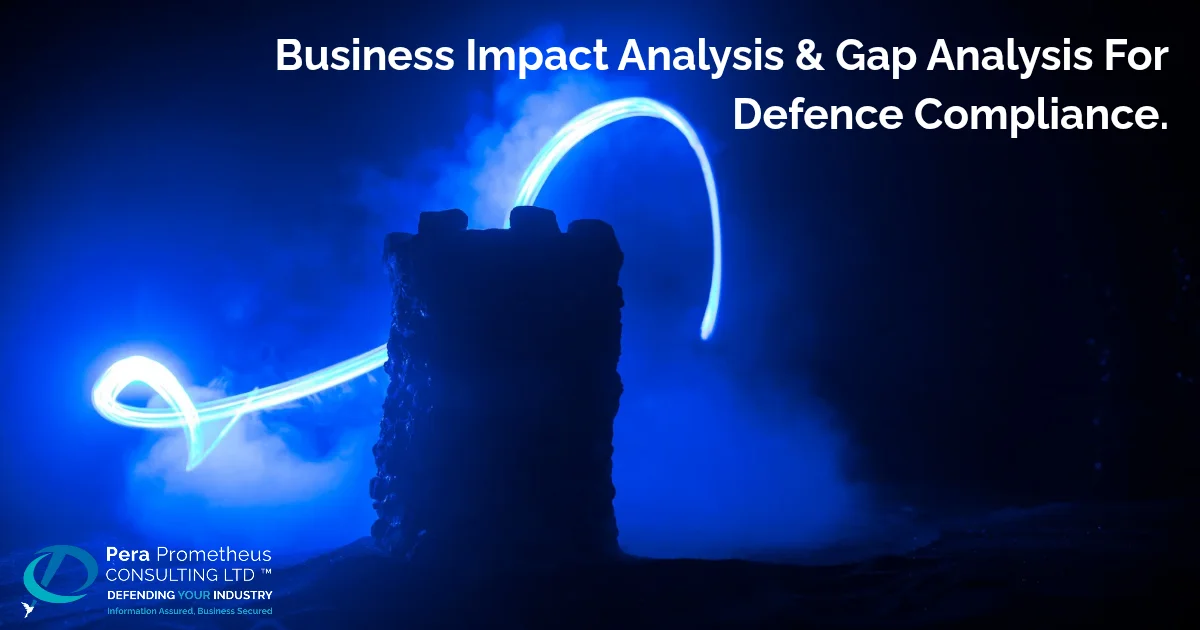– Gareth Shaw, MD Pera Prometheus
Cybersecurity regulations can feel overwhelming for UK businesses, from small enterprises to defence sector partners. With rising cyber threats and mounting compliance requirements, the stakes are high, but this guide simplifies the journey. It explains key frameworks like GDPR, ISO 27001, Cyber Essentials, Defence Cyber Certifications and NIS (Network & Information System) Regulations in clear terms, answers common questions, and provides a practical roadmap for compliance. Backed by data from trusted sources like the National Cyber Security Centre (NCSC) and the Information Commissioner’s Office (ICO), this resource equips SMEs and defence businesses with actionable steps to protect assets, build trust, and secure contracts.
Why Cybersecurity Compliance Matters
Cybercrime is a growing threat to UK businesses. The 2024 UK Government Cyber Security Breaches Survey reports that 50% of UK businesses faced a cyber-attack or breach in the past year, with medium and large firms particularly vulnerable (70% affected). Yet only 22% have a tested incident response plan, leaving many exposed. For defence sector partners, supply chain vulnerabilities pose an even greater risk, potentially compromising sensitive Ministry of Defence (MOD) data and national security.
Compliance goes beyond avoiding penalties; it safeguards critical assets, enhances customer confidence, and opens doors to new opportunities. For instance, Cyber Essentials certification can reduce insurance premiums and is often mandatory for government contracts. In the defence sector, aligning with standards like ISO 27001 can secure high-value MOD contracts. This guide breaks down the essential frameworks and offers a clear path forward.
Understanding Key Cybersecurity Frameworks
Compliance starts with understanding the core regulations and standards. Below is a straightforward explanation on each.
UK GDPR: Safeguarding Personal Data: The UK General Data Protection Regulation governs the handling of personal data, such as customer contact details or employee records. It requires businesses to implement appropriate technical and organisational measures to protect data from breaches. This includes encryption, multi-factor authentication (MFA), and regular risk assessments.
Any business processing personal data must comply with GDPR. Failure to do so risks fines of up to £17.5 million or 4% of global annual turnover, whichever is higher. For example, the ICO issued a fine of £20 million to British Airways for failing to protect personal and financial details of more than 400,000 of its customer details. The data breach occurred in 2018. Businesses must also report breaches within 72 hours, making proactive security essential.
ISO 27001: Comprehensive Security Management: This is an International Organisation for Standardisation on Information Security Management System (ISMS). It includes controls across areas like policies, staff training, access management, and physical security. While not mandatory, certification demonstrates a serious commitment to security, making it valuable for businesses seeking trust from clients or regulators.
For SMEs, achieving ISO 27001 typically takes 6 to 12 months, involving a gap analysis, control implementation, and an external audit. Pera Prometheus has supported several UK defence suppliers to achieve ISO 27001 certification aligning them with information security standards required by MOD.
Cyber Essentials: The Foundation of Protection: This is a UK government-backed scheme designed to protect against common cyber threats. It focuses on five key controls: firewalls, secure configuration, user access control, malware protection, and patch management. It offers two levels:
– Cyber Essentials: A self-assessment costing from approximately £300 + VAT, ideal for SMEs.
– Cyber Essentials Plus: Includes an independent audit for greater credibility.
According to the NCSC, Cyber Essentials can prevent 80% of common attacks. It’s often a prerequisite for government contracts and can lower cyber insurance premiums. Cyber Essentials resources from NCSC is a good segway to achieving the certification.
Defence Cyber Certification: A New Standard for Defence Suppliers: The Defence Cyber Certification (DCC), developed by the MOD with IASME, introduces a streamlined approach to cybersecurity for UK defence suppliers, replacing the contract-by-contract Supplier Assurance Questionnaire (SAQ) with a single, organisation-wide assessment valid for three years, subject to annual check-ins. Launched with Level 0, it aligns with Cyber Essentials and scales through Levels 1 to 3 based on a supplier’s cyber risk profile (CRP) as defined by Defence Standard 05-138, with controls ranging from 101 (Level 1) to 144 (Level 3). While not yet mandatory, DCC is expected to become a standard requirement, encouraging suppliers to achieve certification, starting with an IASME-accredited body assessment to enhance resilience and meet MOD contract expectations.
Read more:Defence Cyber Certification
NIS Regulations: Resilience for Critical Sectors:
The Network and Information Systems (NIS) Regulations provides legal measures to boost the overall level of security (both cyber and physical resilience) of network and information systems that are critical for the provision of digital services (online marketplaces, online search engines, cloud computing services) and essential services (transport, energy, water, health, and digital infrastructure services). They require robust risk management, proportionate security measures, and incident reporting to regulators like the ICO.
These frameworks complement each other. For example, Cyber Essentials controls can support GDPR’s security requirements, while ISO 27001 provides a comprehensive structure for both GDPR and NIS compliance.
Answering Your Common Questions
Business leaders often have pressing questions about compliance. Here are clear answers to the most common ones:
1. Which regulations apply to my business?
It depends on your business operations. There could be other compliance regulations that could be essential for your business. But in general, GDPR applies to any business handling personal data, check the ICO’s guidance to confirm. If you are bidding for government contracts, then it typically needs Cyber Essentials and if you are in the business of supporting critical national infrastructure then you must comply with NIS. The NCSC’s Cyber Assessment Framework can help identify specific obligations.
Read more: CAF and Cyber Security Resilience
2. How does GDPR impact cybersecurity compliance?
GDPR requires robust cybersecurity measures, such as encryption and MFA, to protect personal data. It also mandates breach notifications within 72 hours. The 2024 Breaches Survey highlights that 32% of UK businesses faced phishing-related breaches, often leading to GDPR violations. For defence industry partners, mishandling MOD data risks both fines and contract penalties.
3. What’s the difference between ISO 27001 and Cyber Essentials?
Cyber Essentials is a UK-focused, entry-level scheme with five controls to block common cyber threats, making it ideal for SMEs on a budget. ISO 27001 is a global, in-depth ISMS suited for larger firms or defence businesses needing auditable security. Cyber Essentials takes weeks to achieve; ISO 27001 takes months. SMEs can start with Cyber Essentials and scale to ISO 27001 for greater credibility if required.
4. Where do I start with compliance?
Begin with a self-assessment using free tools from the NCSC or ICO. Defence businesses should review Defence Cyber Protection Partnership. Prioritise Cyber Essentials for SMEs or align with MOD standards for defence contracts.
What is the Compliance Roadmap?
Businesses are often familiar with the framework and regulation but many struggle on how to achieve compliance. A compliance roadmap is like a journey: assess your starting point, plan the route, and monitor progress. You have a choice of either getting support from experts like Pera Prometheus or build your own roadmap. Below are some practical guidance on how based on the NCSC’s 10 Steps to Cyber Security:
1. Conduct a Risk Assessment: Identify critical assets (e.g., customer data, intellectual property) and threats (e.g., ransomware, phishing). SMEs can use the NCSC’s Risk Management Guidance and Defence industry partners should consider supply chain risks, as highlighted in recent MOD alerts.
2. Perform a Gap Analysis: Compare current security practices against GDPR, Cyber Essentials, or ISO 27001 requirements. The ICO’s Data Protection Self-Assessment is a free tool to identify weaknesses. Experts like Pera Prometheus can also support SMEs and defence industry partners to conduct Business Impact Analysis (BIA) and identify business priorities for business continuity during an incident.
3. Develop Policies and Procedures: Establish clear rules for data access, remote working, and device usage. Align with ISO 27001’s control framework for structure. Don’t ignore the physical security, ensure to adapt access controls and have clear policies and procedures accessible by all the staff. Seek support from experts like Pera Prometheus if you don’t have the inhouse skills to generate these policies and procedures.
4. Implement Staff Training: Human error drives 70% of breaches, according to the [2024 Breaches Survey. Engaging training, like tailored programs to your business can reduce cyber and information security risk. SMEs sees a huge drop in phishing incidents after six months of training.
5. Set Up Incident Response Planning: Create a plan for detecting, responding to, and recovering from incidents. Test it annually—only 22% of businesses do, per the NCSC. Include GDPR’s 72-hour breach notification requirement.
6. Adopt Technical Controls: Implement Cyber Essentials basics, such as firewalls and regular patching. For NIS-regulated sectors, ensure network resilience and enhance protection by installing technologies like endpoint detection software.
7. Conduct Penetration Testing: Simulate attacks to uncover vulnerabilities, a key requirement for ISO 27001 and MOD compliance. This is one of the best ways to identify business vulnerability (physical and digital) in a safe way. Pera Prometheus expertise on this and can provide tailored penetration testing services.
8. Achieve Certification: Achieve certification like Cyber Essentials, ISO 27001 or Defence Cyber Certification to gain credibility or showcase assurance to your clients. The journey to achieving these certifications will ensure your business has the resilience required against security threats.
10. Maintain and Improve: Compliance is ongoing. Review annually to align with the National Cyber Resilience Strategy and any other changing compliances.
My Closing Thoughts: Compliance Is Within Reach
Cybersecurity compliance doesn’t have to be a maze. With GDPR, ISO 27001, Cyber Essentials, DCC and NIS Regulations, businesses can protect their operations, meet legal requirements, and gain a competitive edge. Whether an SME starting small or a defence business navigating stringent MOD standards, a clear roadmap makes compliance achievable. If in doubt, seeking support from consultants like us is the best approach.
Stay Safe, Stay Secure




